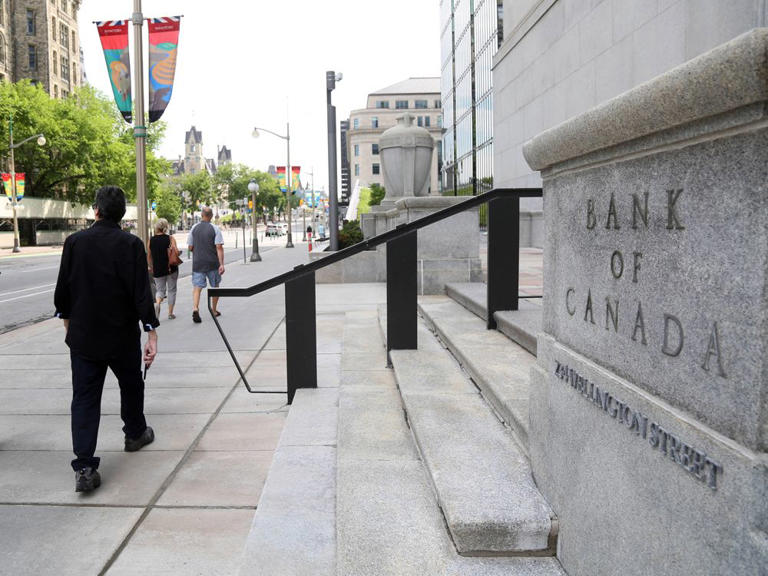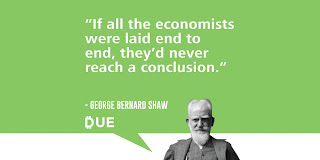Story by Gigi Suhanic •11h
Financial Post

Pedestrians walk past the Bank of Canada in Ottawa.
Canadians’ view of the state of the economy continues to deteriorate, a new poll suggests, just as the Bank of Canada prepares to announce its latest interest rate decision .
A survey by Maru Public Opinion found the mood about the economy continued to sour over the summer, with only 33 per cent of people saying they believe the national economic outlook will improve over the next 60 days, down from 38 per cent in July and 41 per cent in the May edition of the poll of approximately 1,500 Canadians.
People are also more pessimistic about the prospects for their local economies, with 35 per cent expecting them to improve over the next two months, down from 40 and 41 per cent in the previous months.
“The sentiment reality: Things are dismal,” said John Wright, executive vice-president of Maru Public Opinion in a press release accompanying the latest results of the consumer sentiment survey, which was conducted from Aug. 25 to Aug. 27.
The results offered an echo of the latest GDP data from Statistics Canada that showed the economy contracted 0.2 per cent annualized in the second quarter. GDP slowed due to a drop in housing investment, smaller inventory accumulation, and slower international exports and household spending, the data agency said.
Analysts and the Bank of Canada had forecast GDP to grow 1.2 per cent and 1.5 per cent, respectively, in the second quarter.
Early estimates for July indicated GDP was flat, StatCan said.
The GDP shocker and an increase in the unemployment rate in July to 5.5 per cent have left most economists expecting the Bank of Canada to hold rates at five per cent, the highest level since 2001, when it meets on Sept. 6 . The bank has increased its benchmark lending rate 10 times from the pandemic-low rate of 0.25 per cent.
Economists expect GDP to keep softening as higher interest rates continue to seep through the Canadian economy. Many also said they believe the slowdown in GDP will finally bring an end to any more rate hikes .
“On the economic front, there’s still much more potential pain to come, especially if there is more than a soft-landing recession in the cards,” Wright said.
The Maru Household Outlook Index (MHOI), which is based on the results survey, has been mired in pessimism for some time. It registered 86 for August and has been stuck at that level for the last three months just off the index’s lowest reading of 83 in March.
The base number for the index is 100. A result above 100 indicates optimism and below that threshold pessimism. Canadians appeared to have the wind at their backs in July 2021 with the index soaring to 107 as the pandemic shackles loosened.
However, the long-running survey provides a time capsule of the ever-worsening condition of people’s personal finances.
For example, more than a third of Canadians said they struggled to make ends meet in August up from 27 per cent in April 2021. Meanwhile, 31 per cent said they rely on government payments to square up their budget, a 12 percentage point increase from 19 per cent in May 2022.

Pedestrians walk past the Bank of Canada in Ottawa.
Canadians’ view of the state of the economy continues to deteriorate, a new poll suggests, just as the Bank of Canada prepares to announce its latest interest rate decision .
A survey by Maru Public Opinion found the mood about the economy continued to sour over the summer, with only 33 per cent of people saying they believe the national economic outlook will improve over the next 60 days, down from 38 per cent in July and 41 per cent in the May edition of the poll of approximately 1,500 Canadians.
People are also more pessimistic about the prospects for their local economies, with 35 per cent expecting them to improve over the next two months, down from 40 and 41 per cent in the previous months.
“The sentiment reality: Things are dismal,” said John Wright, executive vice-president of Maru Public Opinion in a press release accompanying the latest results of the consumer sentiment survey, which was conducted from Aug. 25 to Aug. 27.
The results offered an echo of the latest GDP data from Statistics Canada that showed the economy contracted 0.2 per cent annualized in the second quarter. GDP slowed due to a drop in housing investment, smaller inventory accumulation, and slower international exports and household spending, the data agency said.
Analysts and the Bank of Canada had forecast GDP to grow 1.2 per cent and 1.5 per cent, respectively, in the second quarter.
Early estimates for July indicated GDP was flat, StatCan said.
The GDP shocker and an increase in the unemployment rate in July to 5.5 per cent have left most economists expecting the Bank of Canada to hold rates at five per cent, the highest level since 2001, when it meets on Sept. 6 . The bank has increased its benchmark lending rate 10 times from the pandemic-low rate of 0.25 per cent.
Economists expect GDP to keep softening as higher interest rates continue to seep through the Canadian economy. Many also said they believe the slowdown in GDP will finally bring an end to any more rate hikes .
“On the economic front, there’s still much more potential pain to come, especially if there is more than a soft-landing recession in the cards,” Wright said.
The Maru Household Outlook Index (MHOI), which is based on the results survey, has been mired in pessimism for some time. It registered 86 for August and has been stuck at that level for the last three months just off the index’s lowest reading of 83 in March.
The base number for the index is 100. A result above 100 indicates optimism and below that threshold pessimism. Canadians appeared to have the wind at their backs in July 2021 with the index soaring to 107 as the pandemic shackles loosened.
However, the long-running survey provides a time capsule of the ever-worsening condition of people’s personal finances.
For example, more than a third of Canadians said they struggled to make ends meet in August up from 27 per cent in April 2021. Meanwhile, 31 per cent said they rely on government payments to square up their budget, a 12 percentage point increase from 19 per cent in May 2022.
Half of people said they are worried about their finances and one quarter said they were worse off in August compared with July.
Further, those who say they will likely default on a major loan or mortgage doubled to 16 per cent last month from eight per cent in May.
Further, those who say they will likely default on a major loan or mortgage doubled to 16 per cent last month from eight per cent in May.

No comments:
Post a Comment